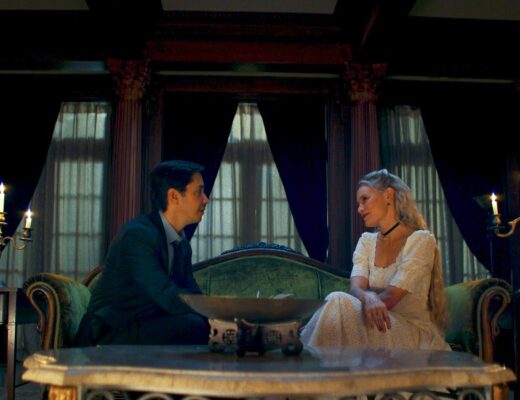Of all contemporary genres, horror seems the most susceptible to pastiche and the endless recycling of familiar tropes. Sequels and reboots are released at an alarming rate, while so-called “revisionist” films make superficial changes to old forms in an attempt to flatter audiences with a wink and a nudge. What is so bracing about Paul Duane’s new All You Need is Death is how it manages to make two well-trod sub-genres of horror — Lovecraftian and regional folk — feel fresh and exciting. It’s not simply that Duane’s film is exceptionally weird and dazzlingly creepy (although it is both), but that it is willing to excavate the past and situate it firmly in our present tense.
As the movie begins, we meet Anna (Simone Collins) and her boyfriend, Aleks (Charlie Maher). They are surreptitiously recording a local singer performing a Gaelic ballad in a small pub. We come to understand that the duo are in a band together, and when they are not performing for audiences, they are essentially musical archaeologists, constantly searching for old, undiscovered folk songs and hymns. In other words, authenticity is the name of the game; one meeting with a potential buyer goes south when the pair cannot prove the song’s specific provenance. Undeterred, Anna and Aleks meet with Agnes (Catherine Siggins), a sort of guru who offers seminars on how to seek out historical oddities and separate the wheat from the chafe: “The future is picked clean,” says Agnes. “Treasure lies in the past.” Anna performs a song for Agnes, who is impressed and encourages the duo to keep digging into the music’s background. Some investigating leads the couple to an old woman named Rita ((Olwen Fouéré), an elderly drunk living in a ramshackle home in the middle of nowhere. Much to their surprise, Anna and Aleks find Agnes there, too; she has hunted down the same leads in an effort to scoop the competition (ancient recordings are a cutthroat business, it seems). After much needling and baseless promises, the trio convince Rita to perform a song for them, but only under two conditions: that they cannot record it, and Aleks must leave the house. Only women can hear or perform the song, an ancient tradition that Rita will not betray. The song, roughly translated from the Gaelic as “Love is a knife with a blade for a handle,” is mesmerizingly harsh, somehow simultaneously melodic and guttural, like a buzzsaw. It’s a showstopping moment, so much so that it ruptures the film and sends the narrative spiraling into madness and obsession. Despite Rita’s exhortations, Agnes secretly records her performance, breaking a 1000-year-old covenant and unleashing something ancient in the process. Soon, Rita’s son Breezeblock (Nigel O’Neill) is tracking down the trio who conned his mother, while Aleks leaves Agnes and runs off with Rita. They’ve all been infected, victims of their own hubris and lack of morals. The second half of the film details Breezeblock’s quest, Anna’s own search for Aleks, and Aleks’ strange transformation into something sinister.
Duane has made his own career investigating the books and crannies of underground culture; Very Extremely Dangerous documents Memphis musician and certified insane person Jerry McGill; While You Live, Shine details music expert Chris King’s collection of blues and folk music from the early 20th century; Welcome to the Dark Ages chronicles the return of the muscial duo The KLF (Kopyright Liberation Front) after a decade-long hiatus. All the work suggests a thorny relationship with the past — a desire for knowledge, certainly, but also cautionary tales of embarking on journeys that might lead to dangerous places. All You Need Is Death is the low-budget, black metal version of Duane’s previous documentaries. These characters might be genuinely interested in excavating the past for aesthetic reasons, but by ignoring tradition they wind up losing what made the music special in the first place. Death is ultimately a warning about colonizing the past and exploiting outsider art in the endless pursuit of money; perhaps some underground work simply cannot be commodified and assimilated into the mainstream. Duane’s film does not feel singular because it eschews any and all influences — it is very squarely a folk horror film. But it treats its influences as something to be afraid of, as something potentially dangerous. In this way, it honors the horror film rather than simply regurgitating it. Featuring music by Ian Lynch, some remarkable sound design by Niall Brady, and fine digital cinematography by Conor Rotherham, Duane’s film is an eerie, cryptic delight, and a paean to DIY ingenuity. This stuff here is the real, uncut deal.
DIRECTOR: Paul Duane; CAST: Olwen Fouére, Simone Collins, Charlie Maher, Catherine Siggins; DISTRIBUTOR: XYZ Films; IN THEATERS: April 11; RUNTIME: 1 hr. 31 min.







